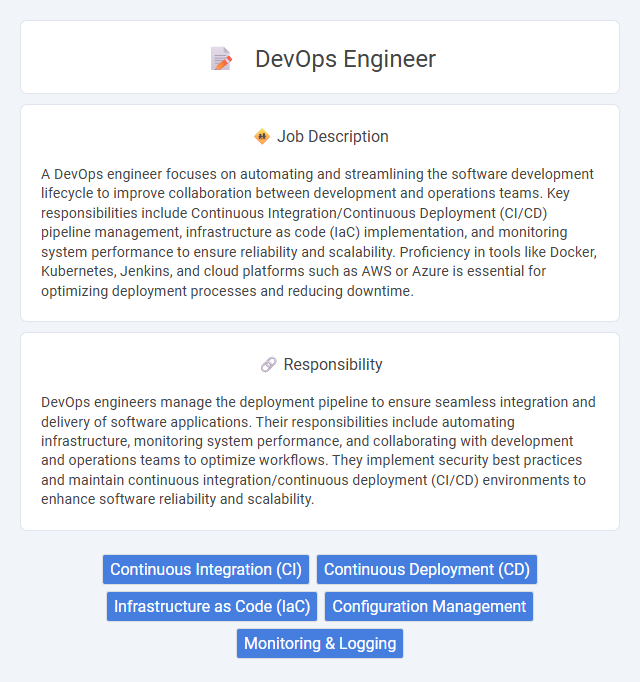
A DevOps engineer focuses on automating and streamlining the software development lifecycle to improve collaboration between development and operations teams. Key responsibilities include Continuous Integration/Continuous Deployment (CI/CD) pipeline management, infrastructure as code (IaC) implementation, and monitoring system performance to ensure reliability and scalability. Proficiency in tools like Docker, Kubernetes, Jenkins, and cloud platforms such as AWS or Azure is essential for optimizing deployment processes and reducing downtime.
Individuals who thrive in fast-paced, collaborative environments with strong problem-solving skills and a passion for continuous learning are likely well-suited for a DevOps engineer role. Those comfortable with automation, cloud technologies, and integration between development and operations teams may find this career path aligns with their strengths. Conversely, people who prefer routine, isolated tasks or lack adaptability to rapid technological changes might struggle in this dynamic field.
Qualification
A DevOps engineer typically requires proficiency in cloud platforms such as AWS, Azure, or Google Cloud, alongside strong skills in automation tools like Jenkins, Docker, and Kubernetes. Expertise in scripting languages such as Python, Bash, or Ruby is essential to streamline deployment processes and manage infrastructure as code. Certifications like AWS Certified DevOps Engineer or Certified Kubernetes Administrator significantly enhance qualification and demonstrate industry-recognized competence.
Responsibility
DevOps engineers manage the deployment pipeline to ensure seamless integration and delivery of software applications. Their responsibilities include automating infrastructure, monitoring system performance, and collaborating with development and operations teams to optimize workflows. They implement security best practices and maintain continuous integration/continuous deployment (CI/CD) environments to enhance software reliability and scalability.
Benefit
A DevOps engineer is likely to experience significant career growth due to the increasing demand for efficient development and operations workflows. The role probably offers high salaries and opportunities to work with cutting-edge technologies, enhancing professional skills. Job stability could be strong given the critical nature of bridging development and IT operations in modern businesses.
Challenge
A DevOps engineer likely faces complex challenges involving the integration of development and operations to streamline software delivery. They might often encounter difficulties optimizing automation pipelines while ensuring system reliability and security. The role probably demands continuous learning to adapt to evolving tools and technologies, making problem-solving a frequent necessity.
Career Advancement
DevOps engineer roles offer significant career advancement opportunities through mastery of continuous integration and continuous deployment (CI/CD) pipelines, cloud infrastructure management, and automation tools like Kubernetes and Terraform. Expertise in scripting languages such as Python and proficiency in containerization accelerate promotion to senior engineering or DevOps architect positions. Companies increasingly prioritize scalable, automated solutions, driving demand for engineers who can optimize software delivery and infrastructure reliability for enterprise-level environments.
Key Terms
Continuous Integration (CI)
DevOps engineers specialize in Continuous Integration (CI) by designing automated workflows that streamline code integration, testing, and deployment processes. They implement CI tools like Jenkins, GitLab CI, and CircleCI to ensure rapid and reliable software delivery. Mastery of scripting, containerization, and version control systems such as Git is essential for effective CI pipeline management.
Continuous Deployment (CD)
A DevOps engineer specializing in Continuous Deployment (CD) automates the release process to enable frequent and reliable software delivery. They design and implement CD pipelines using tools like Jenkins, GitLab CI, or CircleCI to ensure seamless integration, testing, and deployment. Expertise in containerization technologies such as Docker and orchestration with Kubernetes enhances the efficiency and scalability of deployment workflows.
Infrastructure as Code (IaC)
A DevOps engineer specializing in Infrastructure as Code (IaC) automates the provisioning and management of IT infrastructure using code-based tools such as Terraform, AWS CloudFormation, and Ansible. Mastery of IaC enables seamless environment consistency, rapid deployment, and simplified infrastructure scalability across cloud platforms like AWS, Azure, and Google Cloud. Expertise in continuous integration and continuous delivery (CI/CD) pipelines ensures efficient version control and infrastructure updates, minimizing downtime and improving system reliability.
Configuration Management
A DevOps engineer specializing in configuration management automates the deployment and maintenance of infrastructure using tools like Ansible, Puppet, and Chef. They ensure consistency across development, testing, and production environments by managing infrastructure as code and implementing version control strategies. This role enhances system reliability, reduces configuration drift, and accelerates continuous integration and continuous delivery (CI/CD) pipelines.
Monitoring & Logging
A DevOps engineer specializes in designing and implementing monitoring and logging systems to ensure application performance and system reliability. They utilize tools like Prometheus, Grafana, ELK Stack, and Splunk to collect, analyze, and visualize metrics and logs for proactive incident detection and resolution. Mastery in setting up alerting mechanisms and automated responses significantly reduces downtime and enhances operational efficiency.
 kuljobs.com
kuljobs.com